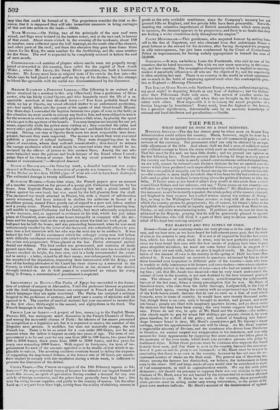I MPROVP.MENT IN Ecerre.—The Pacha of Egypt has succeeded in
the formation of a school of surgery at Alexandria. Until the professors become acquainted with the Arab language their lectures are composed in French and Italian, from which languages they are again translated. The Pacha has assigned a military hospital to the professors of anatomy, and next year a course of medicine will be opened in it. The number of medical students last year amounted to twenty-five in the first class, thirty-eight in the second, and eighty-three in the third. The French language is also taught.
FRENCIT Law OF Atteese.—A project of law, answering to the English Mesne Process Bill, has undergone much discussion in the French Chamber of Peers, and among the mercantile classes of Paris : the lateness of the season prevented its completion as a legislative act, but it is expected to receive the sanctior of the Deputies next session. It modifies, but does not materially ;change, the old French law. There is to be no arrest for a sum under '200 francs, nor for any amount when the debtor is beyond seventy-two years of age. The term of imprisonment is to be one year for any sum from '200 to 500 francs, two years from 500 to 1000 francs, three years from 1000 to 3000 francs, and five years for every sum exceeding 5000 francs. With regard to foreigners, the term of im. priSonment for each of the amounts specified is to be double of that which is applicable to natives. Tme arresting creditors continue bound to defray the expense of supporting the imprisoned debtors, at the former rate of 30 francs per month : their neglect to comply with this regulation during a whole week, is sufficient to procure the liberation of the debtor.
CHINA TRADE.—The Canton newspaper of the 19th February reports as follows :—" An unprecedented degree of languor has attended our import branch of trade this season, no spirit of speculation having created a demand for any one article of foreign commerce, and the prices have generally been kept low ; this may be owing mover supplies, and partly to the scarcity of money. On the other band most ereorts have been high, arising from the avidity of obtaining returns in
goods as the only available remittance, since the Company's treasury has not granted bills on England, and few private bills have been procurable. Notwithstanding the extensive importations of British manufactures which seem yearly to increase, the demand appears to be progressive, and there is no doubt thatthey are finding a wider circulation daily throughout the empire."
COUNT Morernohors.—This gentleman, who acquired honour by uniting him. self to the fate of Napoleon and who obtained front that unfortunate Prince a great fortune as the reward Napoleon, his devotion, after having dissipated his property in silly extravagances, has just been condemned by the Court of Correctional Police to imprisonment, for having unduly appropriated to himself the stun of 33,0001.
SNEERING—It was, we believe, Louis the Fourteenth, who said to one of his courtiers that he hated reasoners. We wish we saw more reasoning in this coml. try, and less sneering. The assumption of superiority which is implied in sneering, renders it peculiarly offensive to all who are the objects of it ; and the superiority is often anything but real. There is no country in the world in which opponents are so much in the habit of employing against each other this contemptible prac. tice as England.—Morning Chronicle.
THE ITALIAN Goon NIGIM—In Northern Europe,we may,without improprietv, say good night: to departing friends at any hour of darkness ; but the Italians utter their Felicissima Nolte only once. The arrival of caudles marks the division between day and night, and when they are brought in, the halms thus
salute each other. How impossible it is to convey the exact properties of a foreign language by translation I Every word, front the highest to the lowest, has a peculiar significance, determinable only by an accurate knowledge of national and local attributes and peculiarities.—Goethe.


















 Previous page
Previous page